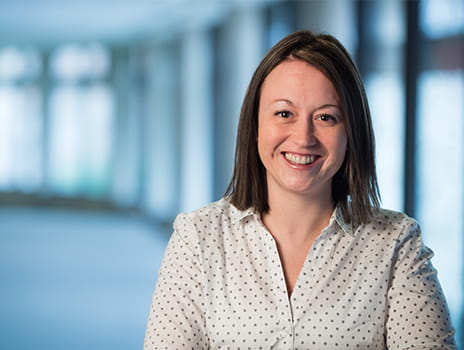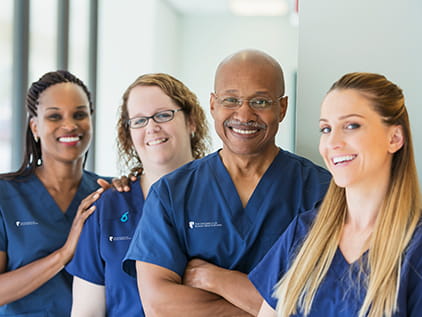Finding Answers


After experiencing epileptic seizures nearly every day of her life since she was 3 years old, Jessica Rostock of Kansas City, Missouri, had surgery that could make the seizures stop. That was in October 2015. A year later, the 35-year-old nursing student is still seizure-free.
At age 3, Jessica was diagnosed with epilepsy after a grand mal seizure. For years, the doctors she was seeing in her community controlled her seizures with anti-epileptic drugs, adjusting them as she grew and matured.
By the time she was a teenager, things had changed. "I started having 20 to 30 seizures per day," she says. "I would lose consciousness and display fidgety actions. It was bad. I was on 5 different medications within a 3-month period and having lots of complications."
When Jessica was 18, she had a seizure while driving and hit a telephone pole. Afterward, she had 2 more grand mal seizures. Her search for the right medication continued. She was not aware she had other treatment options.

The University of Kansas Health System's Comprehensive Epilepsy Center is the only program in Kansas and 1 of only 2 in the Kansas City metro to be designated a Level 4 Epilepsy Center. The center treats all types of epilepsy and offers the most advanced diagnosis and treatment options.
In 2010, Jessica and her husband carefully planned her pregnancy. Her doctors replaced her regular medications with prescriptions that would be safer for the baby.
"The pregnancy was a battle," she says. "The new medications didn't work as well to control the seizures, and we were afraid something would happen that would hurt the baby." She experienced several falls and minor injuries, but she is grateful that nothing endangered her pregnancy.
While pregnant, Jessica, who also works as a labor and delivery surgical technician, searched for information on managing epilepsy during pregnancy.
"I did a ton of research," she says. "There just wasn't much information available."
Jessica delivered her healthy baby boy at a regional healthcare facility and had some difficulty recovering, but she soon felt better.
"I was left wondering how I was going to function. How was I going to feed or hold my newborn without the fear of another seizure? Again, I was searching for answers."

Our progress – and the progress of healthcare in our city and region – depends on the generosity of people like you. Because of such generosity, we're able to expand programs and treatments that save lives. And by giving, we can accelerate our ability to help those who need it most.
In 2015, Jessica started nursing school. "I underestimated what it would take from me. Going to school, working full time and raising a little boy was tough!" she says. After a while, complications such as blurred vision, increased seizures and other issues became serious problems.
After a roller coaster of possibilities, insurance denials and other obstacles, she was still determined to find another answer. "I knew there had to be a better solution," Jessica says.
That's when a friend recommended she go to The University of Kansas Health System, where she saw epileptologist Patrick Landazuri, MD.
"Jessica has been one of my most motivated patients since the first time I saw her," he says.
After extensive testing, Dr. Landazuri confirmed the diagnosis Jessica already knew – that her seizures were isolated in her brain's frontal lobe. But Dr. Landazuri also discovered something she didn't know – she had a small cortical dysplasia. This congenital abnormality causes a form of epilepsy that is especially difficult to control.
After more tests, including invasive video EEG monitoring, Dr. Landazuri determined that Jessica was a candidate for surgery. Neurosurgeon Paul Camarata, MD, agreed that removing a 4.5 x 3 cm area of the frontal lobe of her brain may solve her seizure problems.
"Jessica knew immediately that surgery would give her a chance of being seizure-free," says Dr. Landazuri. "And she never looked back."
The 2 physicians completed the surgery on October 22, 2015, and Jessica has not had a single seizure since.
"I can't thank them enough," Jessica says. "They removed the problem! It's amazing to know what it feels like to live seizure-free. I wish I had come to The University of Kansas Health System from the beginning and especially before I had my baby. They would have helped me manage my symptoms, avoid complications while I was pregnant and answered all my questions post-delivery."
Today Jessica is enjoying life with her husband, Brent, and kindergartner, Braxton. She also has specific career plans. After graduating from nursing school, she hopes to work in neurology. "I'd love to be in the neurosurgery operating rooms," she says.
Jessica also has a passion to help others learn more about epilepsy. "Epilepsy patients are an underserved population and they need a voice!" she says. "Everyone should receive the kind of care I did at The University of Kansas Health System. They were on the team with me. I felt like they were as invested in this as I was."
Update: Jessica shares how her life has changed 18 months after her epilepsy surgery.

..delivered to your inbox each month.
New procedures, technology and insights from our experts every month in our e-newsletter BeWell Connection.
We offer a variety of appointment types. Learn more or call 913-588-1227 to schedule now.